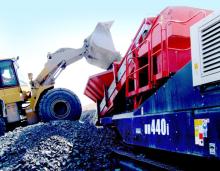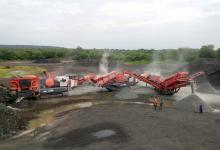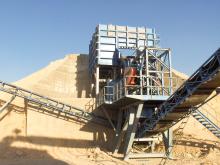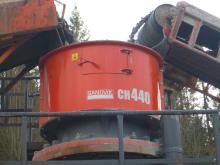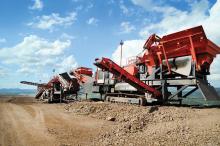
A UK quarry takes advantage of equipment designed to optimise the crushing process, producing a finer product and greater reduction
As the largest independent aggregates company in the UK,
With operations throughout Scotland and central England, its quarries produce and supply crushed limestone, granite, basalt, sand and gravel for a variety of uses in the construction industry.
One of the strategically most important quarries in the supply of high quality aggregates is at Leaton, near Wellington in County Shropshire, where it fulfils a key role as the only quarry supplying hard rock products to the Breedon Aggregates group in England.
The 52 hectare site, which was opened in the 1920s, possesses some 7 million tonnes of reserves and currently supplies Breedon Aggregates plants with Olivine Dolerite, an igneous rock formed in shallow intrusions that push between beds of sedimentary rock. Hard without being too abrasive, it is particularly popular because it can be shaped to suit a wide variety of asphalt applications.
The Leaton quarry operates on six levels each of 14m, the lowest of which has now reached the water table and has to be pumped. Material is currently extracted by blasting, although this has to be done carefully due to folding of the rock beds, which has resulted in some lying at 45° and some almost vertically.
Production of the material at the quarry is maximised by the use of two
Weighing in at 43tonnes, the UH440i crushers are built around a proven and durable Sandvik CH440 cone crusher that delivers the optimum combination of throughput and product shape. The cone crusher is controlled by a patented Automatic Setting Regulation control (ASRi) that is said to give a smooth flow of material and high productivity levels. The entire crushing process is continuously and automatically monitored by the intelligent control system that provides the operator with valuable operational information.
Breedon has noted that the Sandvik machines are producing four different products to a very high quality standard at a rate of approximately 270 tonnes/hour.
The UH440i’s ability to cope with the often onerous nature of the production requirements means that during periods of peak demand they have in the past worked from 5am-11pm, and although the performance of the two Sandvik cone crushers “has been first class,” Stuart Hopley, quarry manager at Leaton, was quick to take advantage of the latest development from Sandvik that aims to optimise the crushing process: the Oversize Breaker Mantle (OBM), producing a finer product and greater reduction through the crusher.
Breedon Aggregates says the operation at Leaton has experienced a maximum net increase in production with a minimum circulating load, achieving a more efficient crushing operation.
The OBM, fitted to both the Leaton Sandvik cone crushers, is able to achieve this more efficient crushing operation due to the latest chamber design. It is able to accept over-sized material in part of the chamber while simultaneously reducing the chamber profile in the opposing part of the chamber, which permits operation at a tighter setting resulting in a finer product being produced on a ‘first-pass basis’ and a superior shape, essential when the equipment is set up to produce single-size products.
Additionally, when the OBM is operated in conjunction with the on-board ASRi control system fitted to the UH440i, greater control can be achieved when producing sub-base material.
“The Sandvik cone crushers have become integral to our production here at Leaton, but we are always keen to take advantage of the latest developments in order to boost our production,” says Stuart Hopley.
“The difference the mantle makes is essentially improved crushing efficiency.
That means, in simple terms, we get better productivity and lower cost per tonne. As Breedon is a company that is keen to minimise its carbon footprint, improved crushing efficiency means not only better production, but also lower emissions.”

